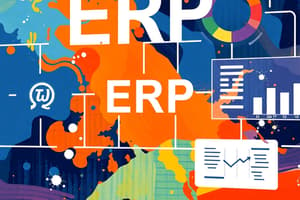Podcast
Questions and Answers
What does the term "Satellite System" refer to?
What does the term "Satellite System" refer to?
Satellite systems are Information Systems (IS) that are generally connected to the ERP system. If the ERP system is viewed as a "planet", then these connected ISs are the "satellites".
What are the primary functions of Operational ISs?
What are the primary functions of Operational ISs?
Operational ISs deal with the execution of day-to-day operations. They support business processes within a company and focus on recording transactions in a simple, often automated, manner, often involving "Cyber Physical Systems" (CPS) such as IoT devices.
Which of the following are examples of Operational ISs?
Which of the following are examples of Operational ISs?
- SRM (Supplier Relationship Management System)
- TMS (Transportation Management System) (correct)
- APS (Advanced Planning and Scheduling System)
- CPM (Corporate Performance Management System)
- WMS (Warehouse Management System) (correct)
- TQM (Total Quality Management System)
- PMS (Project Management System)
- ESS (Executive Support System)
- HRM (Human Resource Management System)
- PLM (Product Lifecycle Management System)
- CRM (Customer Relationship Management System)
- MES (Manufacturing Execution System) (correct)
Explain the primary functions of Tactical ISs.
Explain the primary functions of Tactical ISs.
Which of the following are examples of Tactical ISs?
Which of the following are examples of Tactical ISs?
What are the main characteristics of Strategic ISs?
What are the main characteristics of Strategic ISs?
Which of the following are examples of Strategic ISs?
Which of the following are examples of Strategic ISs?
Operational ISs are mainly focused on recording transactions and supporting immediate action.
Operational ISs are mainly focused on recording transactions and supporting immediate action.
Tactical ISs prioritize supporting the planning and control of operations, often employing a structured approach.
Tactical ISs prioritize supporting the planning and control of operations, often employing a structured approach.
Strategic ISs are highly complicated systems that are typically used to support decision-making in a complex environment.
Strategic ISs are highly complicated systems that are typically used to support decision-making in a complex environment.
What is the primary purpose of CPM (Corporate Performance Management)?
What is the primary purpose of CPM (Corporate Performance Management)?
What are the three main elements comprising CPM?
What are the three main elements comprising CPM?
How are CPM systems changing with the advent of AI?
How are CPM systems changing with the advent of AI?
Which statement best describes the role of CPM in a company?
Which statement best describes the role of CPM in a company?
CPM systems are often used to develop Master Plans and Detailed Plans for future operations.
CPM systems are often used to develop Master Plans and Detailed Plans for future operations.
CPM systems typically include a Balanced Scorecard (BSC) for connecting targets across different areas of the company.
CPM systems typically include a Balanced Scorecard (BSC) for connecting targets across different areas of the company.
CPM systems often use a Performance Management System (PMS) to collect Key Performance Indicators (KPIs) related to different business objectives.
CPM systems often use a Performance Management System (PMS) to collect Key Performance Indicators (KPIs) related to different business objectives.
CPM systems are becoming increasingly reliant on AI to analyze data, identify trends, and provide insights for decision-making.
CPM systems are becoming increasingly reliant on AI to analyze data, identify trends, and provide insights for decision-making.
Explain the difference between strategic CPMs and financial CPMs.
Explain the difference between strategic CPMs and financial CPMs.
What role does a Transportation Management System (TMS) primarily play in an organization?
What role does a Transportation Management System (TMS) primarily play in an organization?
In the context of a Manufacturing Execution System (MES), which activity is NOT a typical function?
In the context of a Manufacturing Execution System (MES), which activity is NOT a typical function?
What is an essential feature of a Transportation Management System (TMS)?
What is an essential feature of a Transportation Management System (TMS)?
Which of the following activities is mainly handled by a Manufacturing Execution System (MES)?
Which of the following activities is mainly handled by a Manufacturing Execution System (MES)?
Which of the following best describes a function of TMS in relation to distribution?
Which of the following best describes a function of TMS in relation to distribution?
What is a primary function of a Warehouse Management System (WMS)?
What is a primary function of a Warehouse Management System (WMS)?
Which of the following is NOT a typical activity associated with a Warehouse Management System?
Which of the following is NOT a typical activity associated with a Warehouse Management System?
What distinguishes a Satellite System in relation to an ERP System?
What distinguishes a Satellite System in relation to an ERP System?
How does a Warehouse Management System ensure efficiency in warehouse operations?
How does a Warehouse Management System ensure efficiency in warehouse operations?
What is a key feature of an Operational IS?
What is a key feature of an Operational IS?
In the context of information systems, how can an IS become a Module of another IS?
In the context of information systems, how can an IS become a Module of another IS?
What element of Warehouse Management Systems makes them user-friendly?
What element of Warehouse Management Systems makes them user-friendly?
Which process is involved in the outgoing items activities of a Warehouse Management System?
Which process is involved in the outgoing items activities of a Warehouse Management System?
Which level of company operations do Satellite Systems primarily support?
Which level of company operations do Satellite Systems primarily support?
Which of the following statements best describes the role of an ERP System in relation to Satellite Systems?
Which of the following statements best describes the role of an ERP System in relation to Satellite Systems?
Flashcards
Satellite System
Satellite System
An information system (IS) that works in conjunction with, and is often connected or incorporated into, an Enterprise Resource Planning (ERP) system.
Operational IS
Operational IS
Information systems that support operational business processes by processing transactions in real-time. They facilitate execution.
WMS (Warehouse Management System)
WMS (Warehouse Management System)
An operational IS that manages warehouse activities like receiving, stocking, and shipping.
TMS (Transportation Management System)
TMS (Transportation Management System)
Signup and view all the flashcards
MES (Manufacturing Execution System)
MES (Manufacturing Execution System)
Signup and view all the flashcards
Tactical IS
Tactical IS
Signup and view all the flashcards
CRM (Customer Relationship Management)
CRM (Customer Relationship Management)
Signup and view all the flashcards
SRM (Supplier Relationship Management)
SRM (Supplier Relationship Management)
Signup and view all the flashcards
HRM (Human Resources Management)
HRM (Human Resources Management)
Signup and view all the flashcards
PLM (Product Lifecycle Management)
PLM (Product Lifecycle Management)
Signup and view all the flashcards
Strategic IS
Strategic IS
Signup and view all the flashcards
APS (Advanced Planning and Scheduling)
APS (Advanced Planning and Scheduling)
Signup and view all the flashcards
TQM (Total Quality Management)
TQM (Total Quality Management)
Signup and view all the flashcards
CPM (Corporate Performance Management)
CPM (Corporate Performance Management)
Signup and view all the flashcards
ESS (Executive Support System)
ESS (Executive Support System)
Signup and view all the flashcards
What is a Satellite System?
What is a Satellite System?
Signup and view all the flashcards
What are the levels of ISs?
What are the levels of ISs?
Signup and view all the flashcards
What is an Operational IS?
What is an Operational IS?
Signup and view all the flashcards
What are Transaction Processing Systems?
What are Transaction Processing Systems?
Signup and view all the flashcards
What does 'facilitates execution' mean?
What does 'facilitates execution' mean?
Signup and view all the flashcards
Typical WMS Activities
Typical WMS Activities
Signup and view all the flashcards
Real-time Monitoring
Real-time Monitoring
Signup and view all the flashcards
Alerts and Recommendations
Alerts and Recommendations
Signup and view all the flashcards
What are Operational ISs?
What are Operational ISs?
Signup and view all the flashcards
Study Notes
ERP Satellite Systems
- ERP Systems are the most comprehensive Information Systems (IS)
- Business Intelligence (BI) Systems are examples of ISs that connect to an ERP System
- Other ISs are like satellites around the central ERP System
- BI Systems can be integrated into an ERP system or exist independently
- Office Automation is a common example of an IS that can be both connected to and included within an ERP System
Learning Objectives
- Discussing the meaning of "Satellite Systems"
- Identifying different types of Operational ISs
- Recognizing Tactical ISs and their functions
- Understanding the characteristics of Strategic ISs
- Exploring the functionalities of Corporate Performance Management (CPM)
Exam Question - text
- Artificial Intelligence (AI) is evolving Corporate Performance Management (CPM) systems into Executive Support Systems (ESS)
- ESS systems extract information from data
- ESS systems can also gain insights from knowledge
- ESS systems can extract knowledge directly from data
- ESS systems can help convert information into knowledge
Q1. What does «Satellite System» mean?
- ERP Systems are the central, most complete ISs
- Other ISs, such as Business Intelligence (BI) Systems, can be connected with or integrated into an ERP to create an Extended ERP System.
- These other ISs, functioning like satellites orbiting a planet, support the ERP System's core functions.
Q2. What are the Operational ISs?
- Operational ISs focus on company operations.
- They support business processes at an operational level.
- They are also known as Transaction Processing Systems (TPS)
- They process transactions (events recorded as data), ensuring execution in real-time.
- This real-time processing permits prompt actions and alerts if tasks aren't completed as expected.
- This system aims for simplicity (often "foolproof").
- Examples include Warehouse Management Systems (WMS) and Transportation Management Systems (TMS).
Q2. What are the Operational ISs? (WMS example)
- A WMS supports warehouse processes (receiving, stocking, and shipping)
- Typical activities include incoming item receipt, quality control, and warehouse operations like loading, counting, and unloading.
- Outgoing item packaging, shipping, and return management are also part of typical WMS functionality.
Q2. What are the Operational ISs? (TMS Example)
- A TMS handles distribution processes like shipments and warehouse transfers.
- Typical functions include planning routes and schedules, coordinating with carriers (private fleet or selected partners), and tracking loads and shipments.
- Post-shipment analysis and tracking are included in core TMS operations.
Q3. And the Tactical ones?
- Tactical Information Systems (tactical ISs) supervise activities at a tactical level.
- They are also called Management Information Systems (MISs).
- Management activities, using transactions as information, support tactical planning and control.
- Systems provide near real-time monitoring, generating actionable plans and warnings if tasks are not completed on schedule.
- CRM (Customer Relationship Management) and SRM (Supplier Relationship Management) systems are common examples.
Q3. And the Tactical ones? (CRM Example)
- A CRM supports a company's customer interactions.
- Key functions such as information dissemination, relationship building, opportunity management, and sales order tracking are carried out by this system.
- Customer feedback and sales follow-up analysis are crucial parts of CRM functionality.
Q3. And the Tactical ones? (SRM Example)
- SRM focuses on supplier interactions for companies.
- Activities include supplier identification, managing invitations to quote, overseeing supplier onboarding, evaluating suppliers, tracking purchase orders, and planning or designing products.
- SRM's role includes analyzing and evaluating reports after completion of supply tasks.
Q3. And the Tactical ones? (HRM Example)
- HRM (Human Resources Management) supports processes concerning employee lifecycle (hiring, training, performance management, separation).
- HRM covers staffing, personnel management, and performance appraisal.
- This system also handles employee orientation, disciplinary actions, compliance with employment regulations, and overall management of the employee relationship.
Q3. And the Tactical ones? (PLM Example)
- Product Lifecycle Management (PLM) systems track the entire product lifecycle (introduction, growth, maturity, and decline).
- Tasks include defining customer requirements, designing and planning products, overseeing realisations, and improving and managing workflows and organizational change.
Q4. And the Strategic ones?
- Strategic ISs are centered on decision-making processes within a company.
- These systems are often called Decision Support Systems due to their role in supporting strategic decisions.
- The systems allow the creation of alternative scenarios and selections from those options in a structured, timely manner.
- Strategic ISs often involve complex calculations, models, and skills from highly-trained personnel.
- Examples include Advanced Planning and Scheduling (APS) and Total Quality Management (TQM) systems.
Q4. And the Strategic ones? (APS Example)
- APS (Advanced Planning and Scheduling) systems support business planning, forecasting, and scheduling production activities.
- APS activities include forecasting demands, defining customer commitments, planning production processes, and scheduling resource allocation.
Q4. And the Strategic ones? (TQM Example)
- TQM (Total Quality Management) focuses on controlling processes to ensure quality across all company operations.
- Activities of this type of system involve assessing quality processes, standardizing procedures, monitoring quality compliance, detecting defects, and making improvements from quality testing.
Q4. And the Strategic ones? (BPMS Examples)
- Business Process Management Systems (BPMS) software enhances TQM systems to execute and assess processes.
Q5. And what about CPM?
- Corporate Performance Management (CPM) is a comprehensive approach used within companies to track and manage their performance metrics.
- It translates strategic information into operational plans.
- This system provides aggregated results to drive improvement efforts.
- It comprises performance monitoring and management methodologies, measures, processes, and systems.
- CPM's ability to connect performance targets with company objectives, resource allocation, internal methods, and business outcomes is critical to their success
Q5. And what about CPM? (Elements of CPM)
- Performance monitoring is one of the key aspects of CPM because it uses planned objectives and detailed processes (like company-wide exercises) to generate company results.
- Defining targets for each objective is an important part of CPM, as is tracking progress and refining objectives.
- CPM continually monitors results and provides essential insights for strategic decisions and goal planning.
Q5. And what about CPM?(Business Processes)
- Strategic Management Activities (such as Master Plans and Balanced Scorecards) are supported by CPM.
- Tactical control activities such as Budgeting and detailed Plans, are overseen by CPM.
Exam Question - solution
- Artificial intelligence (AI) is changing Corporate Performance Management (CPM systems as it converts these systems to executive support systems (ESS)
- ESS systems leverage data and knowledge
- ESS systems extrapolate knowledge from data and present information in a structured manner
References
- Processes, Systems, and Information, by Earl McKinney Jr. and David Kroenke
- Modern ERP, select, implement & use today's advanced business systems, by Marianne Bradford
Studying That Suits You
Use AI to generate personalized quizzes and flashcards to suit your learning preferences.




